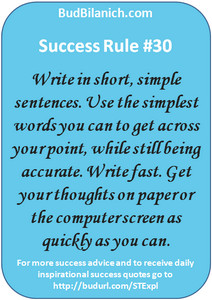 Good writing will set you apart and put you on the road to career success. I have found that most people are poor writers. They are unclear. They ramble. Their e mails, letters and reports are a series of long sentences filled with big words that don’t really say anything. That’s why you can catch people’s attention by writing in a clear, crisp, concise manner.
Good writing will set you apart and put you on the road to career success. I have found that most people are poor writers. They are unclear. They ramble. Their e mails, letters and reports are a series of long sentences filled with big words that don’t really say anything. That’s why you can catch people’s attention by writing in a clear, crisp, concise manner.
I try to write like a journalist. I use short sentences with a simple subject – verb – object structure. My writing may read a little staccato like, but it communicates. People can understand my points and the reasoning behind them.
Your objective in writing at work is to communicate – not to impress others with your vocabulary. When I was speaking with my niece about my book “Straight Talk for Success” at her graduation party, I said that I tried for an “avuncular hip” writing style. She said, “What does that mean?” I replied, “Avuncular means uncle-like. I wanted to sound like a hip uncle to people reading the book.” She came back with a great question, “Why didn’t you just say so?”
She was right. Everybody knows what “uncle-like” means. A lot of people, including cum laude graduates, don’t know the word “avuncular.” I was just showing off my vocabulary by using that word. As a result, I didn’t communicate effectively. This was a verbal example, but the same thinking applies to writing.
Write in short, simple sentences. Use the simplest words you can to get across your point, while still being accurate. Write fast. Get your thoughts on paper or the computer screen as quickly as you can. Then edit and rewrite until you’ve said exactly what you want to say. One of my first bosses always told me that rewriting is the secret to good writing.
Write with the reader in mind. I like a conversational style. It communicates better and engages the reader. Stilted overly formal writing doesn’t communicate. In fact it tends to put off the reader. Read aloud what you’ve written to get a feel for how it will sound in your reader’s mind. If it sounds clear and inviting, you’ve done a good job.
I have worked very hard to make each of these 42 rules clear and inviting. I hope you think they are.
Spelling does count. Correct spelling does two things for you. First, it shows that you have a good command of the language. Second and more important, correct spelling demonstrates that you respect both yourself and the reader. Misspelled words stand out like sore thumbs to readers.
Don’t just spell check your documents. Proof them. Spell check often won’t pick up improper usage in words like “your” and “you’re,”, “hear” and “here,” and “their” and “there.”
The same holds true for punctuation. Make sure that you know how to properly use periods, question marks, commas, colons, semicolons, exclamation marks, quotation marks and apostrophes. If you’re not sure about punctuation rules, spend a little time on the internet learning proper usage.
I like the Poynter Institute for good information about writing. While the information on their site is aimed at journalists, there is a lot of very helpful information about writing and editing there – especially in the article in “Tip Sheets” which can be found by clicking on the “Reporting, Writing and Editing” button.

Wanna learn good writing skills!
Ravi,
Feel free to e-mail me at bud@budbilanich.com and we can discuss how I can help you with your writing skills.
All the best,
Bud